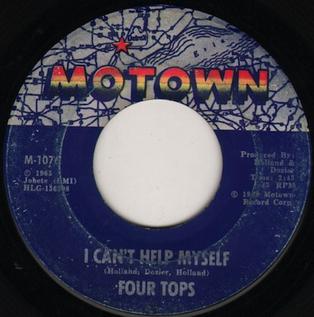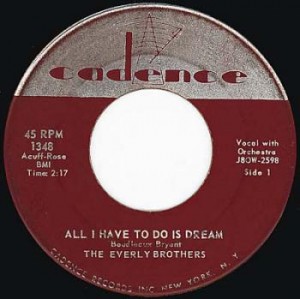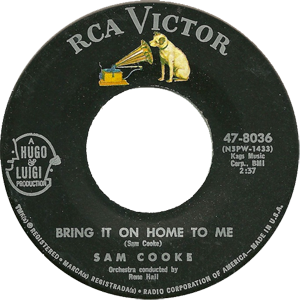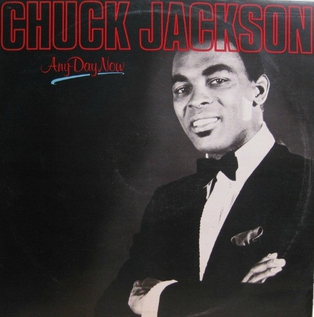Related Research Articles

"I Can't Help Myself" is a 1965 song recorded by the Four Tops for the Motown label.

"(Get Your Kicks on) Route 66" is a popular rhythm and blues song, composed in 1946 by American songwriter Bobby Troup. The lyrics relate a westward roadtrip on U.S. Route 66, a highway which traversed the western two-thirds of the U.S. from Chicago, Illinois, to Los Angeles, California. The song became a standard, with several renditions appearing on the record charts.

"All I Have to Do Is Dream" is a song made famous by the Everly Brothers, written by Boudleaux Bryant of the husband-and-wife songwriting team Felice and Boudleaux Bryant, and published in 1958. The song is ranked No. 141 on the Rolling Stone magazine's list of The 500 Greatest Songs of All Time. The song is in AABA form.

"Since I Don't Have You" is a song written and composed by Jackie Taylor, James Beaumont, Janet Vogel, Joseph Rock, Joe Verscharen, Lennie Martin, and Wally Lester. It was first a 1958 hit single for the doo-wop group the Skyliners on the Billboard Hot 100. Country music singer Ronnie Milsap had a hit with the song in 1991. American hard rock band Guns N' Roses also had some success in 1994 with their version of the song which reached the top 10 on the UK Singles Chart.
"Mountain of Love" is a song written by Harold Dorman. Dorman released his version as a single in 1960. It was originally recorded in late 1959 at the Royal Recording Studios in Memphis before the backing vocals were overdubbed. It performed well, spending 19 weeks on the Billboard Hot 100 chart, peaking at No. 21 in May 1960, while reaching No. 7 on the Billboard Hot R&B Sides chart, and No. 25 on Canada's "CHUM Hit Parade". The song was his only top forty hit on the Billboard Hot 100 and was the highest-charting single of his career.

"Bring It On Home to Me" is a song by American soul singer Sam Cooke, released on May 8, 1962, by RCA Victor. Produced by Hugo & Luigi, and arranged and conducted by René Hall, the song was the B-side to "Having a Party". The song peaked at number two on Billboard's Hot R&B Sides chart, and also charted at number 13 on the Billboard Hot 100. The song has become a pop standard, covered by numerous artists of different genres. It is one of The Rock and Roll Hall of Fame's 500 Songs that Shaped Rock and Roll.

"Let It Be Me" is a popular song originally published in French in 1955 as "Je t'appartiens" interpreted by Gilbert Bécaud. It became popular worldwide with an English version by the Everly Brothers and later with the duet by Betty Everett and Jerry Butler.
"Ain't Nobody's Business" is a 1920s blues song that became one of the first blues standards. It was published in 1922 by Porter Grainger and Everett Robbins. The song features a lyrical theme of freedom of choice and a vaudeville jazz–style musical arrangement. It was first recorded, as "'Tain't Nobody's Biz-ness if I Do", in 1922 by Anna Meyers, backed by the Original Memphis Five.
"(Now and Then There's) A Fool Such as I" is a popular song written by Bill Trader and published in 1952. Recorded as a single by Hank Snow it peaked at number four on the US country charts early in 1953.

"Love Ballad" is a song by R&B/Funk band L.T.D. Jeffrey Osborne is the lead singer.

"Any Day Now" is a popular song written by Burt Bacharach and Bob Hilliard in 1962. It has been recorded by numerous artists over the years, including notable versions by Chuck Jackson in 1962, Alan Price in 1965, Elvis Presley in 1969, Scott Walker in 1973 and Ronnie Milsap in 1982. In the lyrics, the singer predicts the imminent demise of a romantic relationship and describes the sadness this will leave.
"Share Your Love with Me" is a song written by Alfred Braggs and Deadric Malone. It was originally recorded by blues singer Bobby "Blue" Bland. Over the years, the song has been covered by various artists, most notably Aretha Franklin who won a Grammy Award for her 1969 rendition. Other artists who covered the song include The Band in 1973, Kenny Rogers in 1981, and most recently, Van Morrison in 2016.
"Baby Face" is a popular Tin Pan Alley jazz song. The music was written by Harry Akst, with lyrics by Benny Davis, and the song was published in 1926.
"Funny How Time Slips Away" is a song written by Willie Nelson and first recorded by country singer Billy Walker. Walker's version was issued as a single by Columbia Records in June 1961 and peaked at number 23 on the Hot C&W Sides chart. The song has been featured in several live action films and television shows, such as in the first episode of the second season of AMC’s Better Call Saul and in the 2020 Netflix drama The Devil All the Time.
"I Don't Hurt Anymore" is a 1954 song by Hank Snow. It was written by Don Robertson and Jack Rollins.
"The Tip of My Fingers", also titled "The Tips of My Fingers", is a song written and originally recorded by American country music singer Bill Anderson. First included on his 1962 album Bill Anderson Sings Country Heart Songs, the song was a Top Ten country single for him in 1960.
"The Windows of the World" is a song written by Burt Bacharach (music) and Hal David (lyrics) which was a hit single for Dionne Warwick in 1967.

"Sea of Heartbreak" is a song written by Paul Hampton and Hal David and recorded by Don Gibson in 1961. The song reached #2 on the Billboard Hot Country Singles & Tracks chart.

"Fools Fall in Love" is a song by Jerry Leiber and Mike Stoller. It was originally recorded by the Drifters, who took it to number 10 on the R&B chart in 1957. The song reached number 69 on the Billboard Hot 100.

"I Can't Help It (If I'm Still in Love with You)" is a song written and originally recorded by Hank Williams on MGM Records. It hit number two on the Billboard country singles chart in 1951. In his autobiography, George Jones printed the first six lines of the song and stated, "Its lyrics couldn't be more simple - or profound."
References
- ↑ Whitburn, Joel (2004). Top R&B/Hip-Hop Singles: 1942-2004. Record Research. p. 252.
- ↑ Whitburn, Joel (2017). Hot Country Songs 1944 to 2017. Record Research, Inc. pp. 97, 138, 139, 480. ISBN 978-0-89820-229-8.